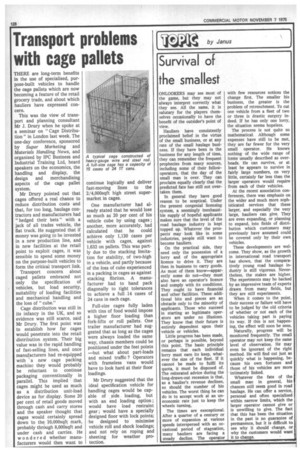Survival of the smallest
Page 130

If you've noticed an error in this article please click here to report it so we can fix it.
ONLOOKERS may see most of the game, but they may not always interpret correctly what they see. All the same, it is salutary for the players themselves occasionally to have the benefit of the outsider's point of view.
Hauliers have consistently proclaimed belief in the virtue of the small business, or at any rate of the small haulage business. If they have been in the business for any length of time, they can remember the frequent prophecies from many sources, including some of their fellowoperators, that the day of the small man is over. They can proclaim equally clearly that the predicted fate has still not overtaken them.
In general they have good reason to be sceptical. Under the present congenial licensing system, a seemingly inexhaustble supply of hopeful applicants makes sure that the level of the road haulage industry is kept topped up. Whatever the prospects may look like in some industries, people still want to become hauliers.
On the practical side, they need only the possession of a lorry and of the appropriate licence to drive it. They are then in business to carry goods. As most of them know—apparently some do not—they must also have an operator's licence and comply with its conditions. They ought to have financial and other facilities. These additional bits and pieces are an obstacle only to the minority of applicants. Those who succeed in starting as legitimate operators are under no illusions. They know that their future is entirely dependent upon their vehicle or vehicles.
Little progress has been made, or perhaps is possible, beyond this point. The basic principle remains that each individual lorry must earn its keep, whatever the size of the fleet. If it cannot be made to fulfil its quota, it must be disposed of. The reiterated advice during the long-drawn-out recession is that, as a haulier's revenue declines, so should the number of his vehicles. The worst thing he can do is to accept work at an uneconomic rate just to keep the wheels turning,
The times are execeptional. After a quarter of a century or more of expansion at various speeds interspersed with an occasional period of stagnation, many hauliers are facing a steady decline. The operator
with few resources notices the change first, The smaller his business, the greater is the problem of retrenchment. To cut one vehicle from a fleet of two or three is drastic surgery indeed. If he has only one lorry, the situation seems hopeless.
The process is not quite so mathematical. Although some expenses have still to be met, they are far fewer for the very small operator. He knows nothing of the wide range of items usually described as overheads. He can survive, or at least he appears to survive in fairly large numbers, on very little, certainly far less than the larger operators would require from each of their vehicles.
At the recent association conferences, there was emphasis on the wider and much more sophisticated services that these larger, and especially the very large, hauliers can give. They are even expanding, or planning to expand, into fields of distribution which customers may previously have assumed could be covered only by their own vehicles.
These developments are welcome. They show, as the growth in international road transport has shown, that the comparatively young road haulage industry is still vigorous. Nevertheless, the stakes are higher. The experiments may be backed by an impressive team of experts drawn from many fields, but they are still experiments.
When it comes to the point, their success or failure will have to be judged by the old criteria of whether or not each of the vehicles taking part is paying its way. If this is not happening, the effect will soon be seen.
Naturally, progress will be monitored frequently. The small operator may not keep the same level of observation. He may even be ignorant of the right method. He will find out just as quickly what is happening, because his own fortunes and those of his vehicles are more intimately linked.
Whatever the fate of the small man in general, his chances still seem good in road haulage. He can offer a service, personal and often specialised within narrow limits, which the larger operator cannot give or is unwilling to give. The fact that this has been the situation in the past is no guarantee of permanence, but it is difficult to see why it should change, or why the customers would want it to change.
















































































































































































































